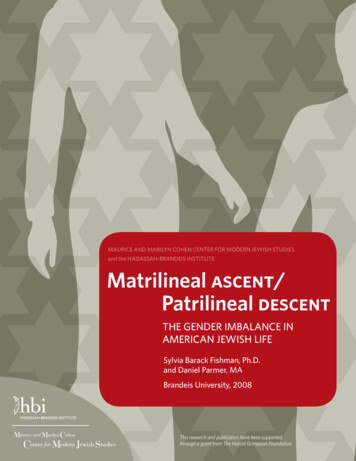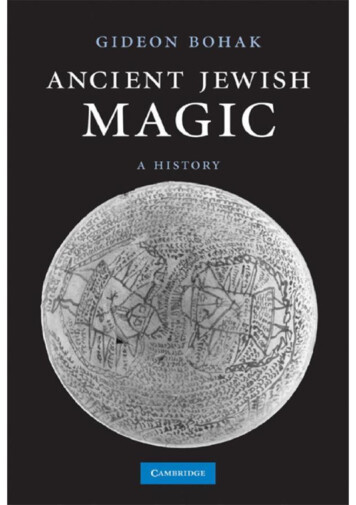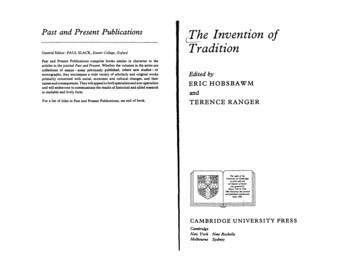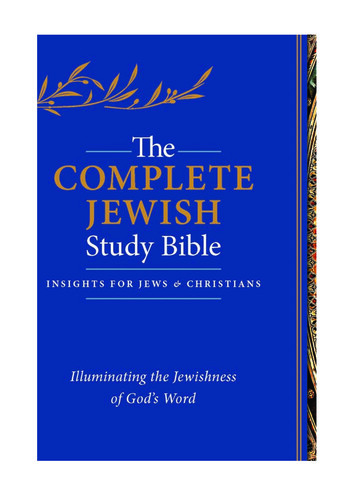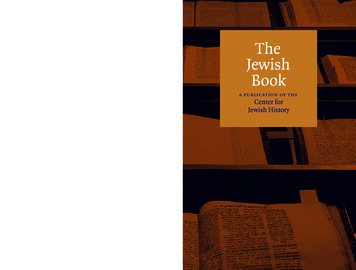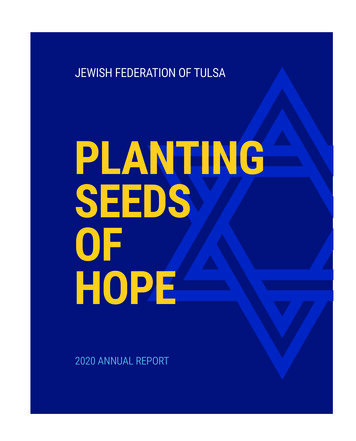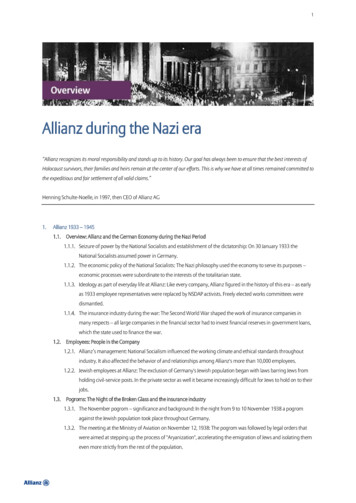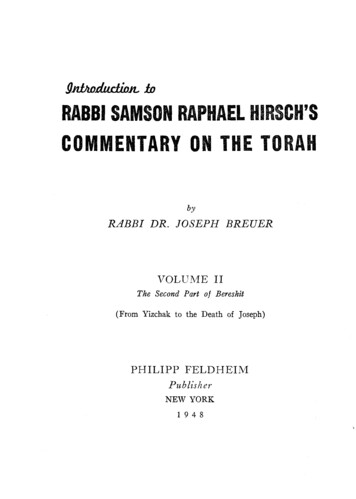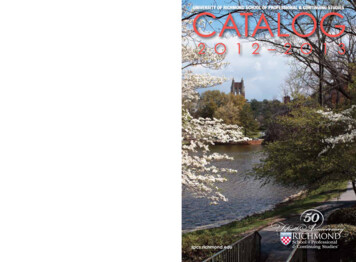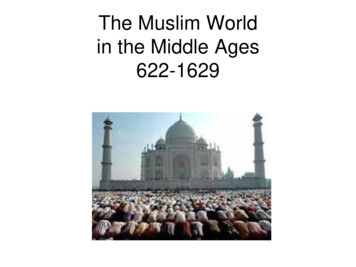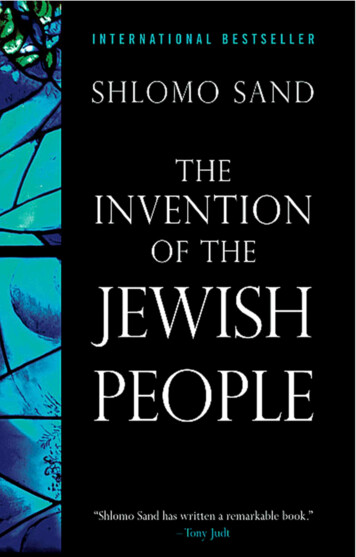
Transcription
The Invention of the Jewish People
The Invention of theJewish PeopleShlomo SandTranslated by Yael LotanVERSOLondon New York
English edition published by Verso 2009 Verso 2009Translation Yael LotanFirst published asMatai ve'ekh humtza ha'am hayehudi?[When and How Was the Jewish People Invented?] Resling 2008All rights reservedThe moral rights of the author have been asserted1 3 5 7 9 10 8 6 4 2VersoUK: 6 Meard Street, London W1F 0EGUS: 20 Jay Street, Suite 1010, Brooklyn, NY 11201www.versobooks.comVerso is the imprint of New Left BooksISBN-13: 978-1-84467-422-0British Library Cataloguing in Publication DataA catalogue record for this book is available from the British LibraryLibrary of Congress Cataloging-in-Publication DataA catalog record for this book is available from the Library of CongressTypeset by Hewer Text UK Ltd, EdinburghPrinted in the US by Maple Vail
To the memory of the refugees who reached this soiland those who were forced to leave it.
ContentsPREFACE TO THE ENGLISH-LANGUAGE EDITIONINTRODUCTION: BURDENS OF MEMORYIdentity in Movement1Constructed Memories141.MAKING NATIONS: SOVEREIGNTY AND EQUALITYLexicon: "People" and Ethnos 24The Nation: Boundaries and Definitions31From Ideology to Identity 39From Ethnic Myth to Civil Imaginary45The Intellectual as the Nations "Prince" 542.MYTHISTORY: IN THE BEGINNING,GOD CREATED THE PEOPLEThe Early Shaping of Jewish History 65The Old Testament as Mythistory71Race and Nation78A Historians' Dispute81A Protonationalist View from the East 87An Ethnicist Stage in the West 95The First Steps of Historiography in Zion 100Politics and Archaeology 107The Earth Rebels against Mythistory 115The Bible as Metaphor 1233.THE INVENTION OF THE EXILE:PROSELYTISM AND CONVERSIONThe "People" Exiled in 70 CE 130Exile without Expulsion—History in the Twilight Zone136Against Its Will, the People Emigrate from the Homeland 143"All Nations Shall Flow Unto It" 150The Hasmoneans Impose Judaism on Their Neighbors 154ÎX12364129
viiiFrom The Hellenistic Sphere to Mesopotamian Territory 161Judaizing in the Shadow of Rome 166How Rabbinical Judaism Viewed Proselytizing173The Sad Fate of the Judeans 178Remembering and Forgetting the "People of the Land"1824.5.REALMS OF SILENCE:IN SEARCH OF LOST (JEWISH) TIMEArabia Felix: The Proselytized Kingdom of Himyar 192Phoenicians and Berbers: The Mysterious Queen KahinaJewish Kagans? A Strange Empire Rises in the East 210Khazars and Judaism: A Long Love Affair?218Modern Research Explores the Khazar Past 230The Enigma: The Origin of Eastern Europe's Jews 238190199THE DISTINCTION: IDENTITY POLITICS IN ISRAELZionism and Heredity256The Scientific Puppet and the Racist Hunchback272Founding an Ethnos State 280"Jewish and Democratic"—An Oxymoron?292Ethnocracy in the Age of Globalization307250ACKNOWLEDGMENTS314INDEX315
Preface to the English-Language EditionThis book was originally written in Hebrew. My mother tongue is actuallyYiddish, but Hebrew has remained the language of my imagination, probably ofmy dreams and certainly of my writing. I chose to publish the book in Israelbecause initially my intended readers were Israelis, both those who see themselves as Jews and those who are defined as Arabs. My reason was simpleenough: I live in Tel Aviv, where I teach history.When the book first appeared in early 2008, its reception was somewhatodd. The electronic media were intensely curious, and I was invited to takepart in many television and radio programs. Journalists, too, turned theirattention to my study, mostly in a favorable way. By contrast, representativesof the "authorized" body of historians fell on the book with academic fury, andexcitable bloggers depicted me as an enemy of the people. Perhaps it was thiscontrast that prompted the readers to indulge me—the book stayed on thebestseller list for nineteen weeks.To understand this development, you have to take a clear-eyed lookat Israel and forgo any bias for or against. I live in a rather strange society.As the closing chapter of the book shows—to the annoyance of many bookreviewers—Israel cannot be described as a democratic state while it sees itselfas the state of the "Jewish people," rather than as a body representing all thecitizens within its recognized boundaries (not including the occupiedterritories). The spirit of Israel's laws indicates that, at the start of the twentyfirst century, the state's objective is to serve Jews rather than Israelis, and toprovide the best conditions for the supposed descendants of this ethnos ratherthan for all the citizens who live in it and speak its language. In fact, anyoneborn to a Jewish mother may have the best of both worlds—being free to livein London or in New York, confident that the State of Israel is theirs, even ifthey do not wish to live under its sovereignty. Yet anyone who did not emergefrom Jewish loins and who lives in Jaffa or in Nazareth will feel that the state inwhich they were born will never be theirs.Yet there is a rare kind of liberal pluralism in Israel, which weakens in timesof war but functions quite well in peacetime. So far it has been possible inIsrael to express a range of political opinions at literary events, to have Arabparties take part in parliamentary elections (provided they do not question
XPREFACE TO THE ENGLISH-LANGUAGE EDITIONthe Jewish nature of the state), and to criticize the elected authorities. Certainliberal freedoms—such as freedom of the press, of expression and of association—have been protected, and the public arena is both variegated and secure.That is why it was possible to publish this book, and why its reception in 2008was lively and aroused genuine debate.Furthermore, the tight grip of the national myths has long been loosened.A younger generation of journalists and critics no longer echoes its parents'collectivist ethos, and searches for the social models cultivated in Londonand New York. Globalization has sunk its aggressive talons into the culturalarenas even of Israel and has, in the process, undermined the legends thatnurtured the "builders' generation." An intellectual current known as postZionism is now found, though marginally, in various academic institutions,and has produced unfamiliar pictures of the past. Sociologists, archaeologists,geographers, political scientists, philologists, and even filmmakers have beenchallenging the fundamental terms of the dominant nationalism.But this stream of information and insights has not reached theplateau on which resides a certain discipline, called "The History of theIsraelite People" in Hebrew academies. These institutions have no departments of history as such, but rather departments of general history—such asthe one I belong to—and separate departments of Jewish (Israelite) history. Itgoes without saying that my harshest critics come from the latter. Aside fromrioting minor errors, they chiefly complained that I had no business discussingJewish historiography because my area of expertise is Western Europe. Suchcriticism was not leveled against other general historians who tackled Jewishhistory, provided they did not deviate from the dominant thinking. "TheJewish people," "the ancestral land," "exile," "diaspora," "aliyah," "Eretz Israel,""land of redemption" and so forth are key terms in all reconstructions withinIsrael of the national past, and the refusal to employ them is seen as heretical.I was aware of all this before I began writing this book. I expected myattackers to claim that I lacked a proper knowledge of Jewish history, did notunderstand the historical uniqueness of the Jewish people, was blind to itsbiblical origin, and denied its eternal unity. But it seemed to me that to spendmy life at Tel Aviv University amid its vast collection of volumes and documentsabout Jewish history without taking time to read and tackle them would havebeen a betrayal of my profession. Certainly it is pleasant, as a well-establishedprofessor, to travel to France and the United States to gather material aboutWestern culture, enjoying the power and tranquility of academe. But as a historian taking part in shaping the collective memory of the society I live in, I felt itwas my duty to contribute directly to the most sensitive aspects of this task.
PREFACE TO THE ENGLISH-LANGUAGE EDITIONxiAdmittedly, the disparity between what my research suggested about thehistory of the Jewish people and the way that history is commonly understood—not only within Israel but in the larger world—shocked me as much asit shocked my readers. Generally speaking, educational systems teach you tobegin writing after you have finished your thinking—meaning that you shouldknow your conclusion before you start writing (that was how I obtainedmy doctoral degree). But now I found myself being shaken repeatedly as Iworked on the composition. The moment I began to apply the methods ofErnest Gellner, Benedict Anderson and others, who instigated a conceptualrevolution in the field of national history, the materials I encountered in myresearch were illuminated by insights that led me in unexpected directions. Ishould emphasize that I encountered scarcely any new findings—almost allsuch material had previously been uncovered by Zionist and Israeli historiographers. The difference is that some elements had not been given sufficientattention, others were immediately swept under the historiographers' rug, andstill others were "forgotten" because they did not fit the ideological needs ofthe evolving national identity. What is so amazing is that much of the information cited in this book has always been known inside the limited circles ofprofessional research, but invariably got lost en route to the arena of public andeducational memory. My task was to organize the historical information in anew way, to dust off the old documents and continually reexamine them. Theconclusions to which they led me created a radically different narrative fromthe one I had been taught in my youth.Unfortunately, few of my colleagues—the teachers of history in Israel—feel it their duty to undertake the dangerous pedagogical mission of exposingconventional lies about the past. I could not have gone on living in Israelwithout writing this book. I don't think books can change the world, but whenthe world begins to change, it searches for different books. I may be naive, butit is my hope that the present work will be one of them.Tel Aviv, 2009
Introduction: Burdens of MemoryA Nation . is a group of persons united by a common error about their ancestryand a common dislike of their neighbors.—Karl Deutsch, Nationality and Its Alternatives, 1969I do not think I could have written the book on nationalism which I did write,were I not capable of crying, with the help of a little alcohol, over folk songs.—Ernest Gellner, "Reply to Critics," 1996This book is a work of history. Nonetheless, it will open with a number ofpersonal stories that, like all biographical writing, required a liberal amountof imagination to give them life. To begin like this is less strange than readersmay at first imagine. It is no secret that scholarly research is often motivated bypersonal experiences. These experiences tend to be hidden beneath layers oftheory; here some are proffered at the outset. They will serve the author as thelaunch pad in his passage toward historical truth, an ideal destination that, heis aware, no one ever truly reaches.Personal memory is untrustworthy—we do not know the color of the ink withwhich it was written—and thus one should view the depiction of the followingencounters as inexact and partly fictitious, though no more so than any othertype of biographical writing. As for their possibly troublesome connection withthe central thesis of this book, readers will discover it as they proceed. True, theirtone is sometimes ironic, even melancholic. But irony and melancholy have theiruses, and might jointly be suitable attire for a critical work that seeks to isolate thehistorical roots and changing nature of identity politics in IsraelIDENTITY IN MOVEMENTThe First Story—Two Immigrant GrandfathersHis name was Shulek. Later, in Israel, he was called Shaul. He was born inLodz, Poland, in 1910. At the end of the First World War his father died of theSpanish flu, and his mother went to work as a laborer in a textile plant nearthe city. Two of her three children were put up for adoption with the help ofthe local Jewish community; only Shulek, the youngest, remained at home.He attended a heder for a few years, but his mother's straitened circumstancesforced him out into the streets at an early age, and he began to do various jobs
2THE INVENTION OF THE JEWISH PEOPLEassociated with the processing of textiles. That's how it was in Lodz, Poland'scenter of textile production.The young man shed his parents' ancient faith for fairly ordinary reasons.As his mother had been impoverished by his father's death, the local synagogue ordered her to sit in the back rows of the congregation. Hierarchy ruledin this traditional society. The reduction of financial capital almost always ledto a rapid reduction in symbolic capital, and so the mother's distance fromrespectable social status was mirrored in her distance from the holy Torah.Her son, carried along by the momentum of exclusion, found himself cast outof the house of prayer. Loss of faith among the young in the Jewish quarters ofmajor cities was becoming widespread. Overnight young Shulek, too, foundhimself without a home and without a faith.But not for long. He joined the Communist Party, as was the fashion, whichbrought him in line with the cultural and linguistic majority of Polish society.Soon Shulek became a revolutionary activist. The socialist vision filled his imagination and strengthened his spirit, prompting him to read and think in spiteof the demanding work he did for a living. The party became a haven. Beforelong, however, this warm and lively shelter also got him thrown in prison forpolitical sedition. He spent six years there, and while he never finished school,his education was considerably broadened. Though unable to assimilate Marx'sDas Kapital, he became familiar with the popular writings of Friedrich Engelsand Vladimir Ilych Lenin. He who never finished his heder education, and didnot fulfill his mother's hope that he would enter a yeshiva, became a Marxist.One cold December day in 1939, Shulek saw three Jews hanged in Lodz'scentral avenue—a stunt by some German soldiers who'd been drinking in anearby beer hall. A few days later, he and his young wife and her sister wereswept up with a flood of displaced people rushing eastward toward the RedArmy, which had occupied half of Poland. Shulek did not take his mother along.Later he would say she was old and frail; in fact, she was then fifty years old. Shewas similarly old and also indigent when the ghetto dwellers—and she amongthem—began to be eliminated in slow and cumbersome gas trucks, the primitive extermination technology that preceded the more efficient gas chambers.When the refugees reached the Soviet-occupied area, Shulek knew betterthan to reveal that he was a Communist: Stalin had recently eliminated theleaders of Polish Communism. Instead Shulek crossed the German-Sovietboundary bearing an old-new identity: that of an avowed Jew. At the time, theUSSR was the only country willing to accept Jewish refugees, although it sentmost of them to its Asian regions. Shulek and his wife were fortunate in beingsent to distant Uzbekistan. His sister-in-law, who was educated and spoke several
INTRODUCTION3languages, enjoyed the privilege of being allowed to remain in civilized Europe,which, sadly, had not yet been dubbed Judeo-Christian. So it was that in 1941 shefell into the hands of the Nazis and was dispatched to a crematorium.In 1945, Shulek and his wife returned to Poland, but even in the absence ofthe German army the country continued its rejection of the Jews. Once again thePolish Communist was left without a homeland (unless we count Communism,to which, despite all his troubles, he remained loyal). He and his wife and twosmall children found themselves in a camp for displaced persons in the mountains of Bavaria. There he met one of his brothers, who, unlike Shulek, dislikedcommunism and favored Zionism. History looked on their fates with an ironicsmile: the Zionist brother got a visa to emigrate to Montreal, where he remainedfor the rest of his life, while Shulek and his little family were transferred by theJewish Agency to Marseilles, whence at the end of 1948 they sailed to Haifa.In Israel, Shulek lived for many years as Shaul, though he never became areal Israeli. Even his identity card did not classify him as such. It defined himas Jewish by nationality and religion—since the 1960s, the state had recordeda religion for all citizens, including confirmed unbelievers—but he was alwaysmuch more of a Communist than a Jew, and more of a Yiddishist than a Pole.Though he learned to communicate in Hebrew, he did not much care for thelanguage, and continued to speak Yiddish with family and friends.Shulek was nostalgic for the 'Yiddishland' of Eastern Europe and therevolutionary ideas that had seethed and fermented there before the war. InIsrael he felt he was stealing other people's land; though it wasn't his doing,he continued to regard it as robbery. His obvious alienation was not from thenative-born Sabras, who looked down on him, but from the local climate. Thehot breath of the Levant was not for him. It only intensified his longing for theheavy snows that blanketed the streets of Lodz, the Polish snow that slowlymelted in his memory until his eyes finally closed. At his graveside, his oldcomrades sang "The Internationale."Bernardo was born in Barcelona, Catalonia, in 1924. Years later he would becalled Dov. Bernardo's mother, like Shulek's mother, was a religious womanher entire life, although she attended a church rather than a synagogue. Hisfather, however, had early on abandoned any intensive preoccupation with thesoul and, like many other metalworkers in rebellious Barcelona, become ananarchist. At the beginning of the Spanish Civil War, the anarcho-syndicalistcooperatives supported the young leftist republic and for a while actually ruledBarcelona. But the right-wing, Francoist forces soon reached the city, andyoung Bernardo fought alongside his father in the final retreat from its streets.
4THE INVENTION OF THE JEWISH PEOPLEBernardo's conscription into Franco's military, a few years after the endof the Civil War, did not soften his feelings about the new regime. As an armedsoldier in 1944, he deserted to the Pyrenees, where he helped other opponentsof the regime cross the border. Meanwhile he waited eagerly for the Americanforces to arrive and bring down the cruel ally of Mussolini and Hitler. To hisdismay, the democratic liberators did not even try. Bernardo had no choicebut to cross the border himself and become a stateless person. He worked as aminer in France, then stowed away on a ship in hope of reaching Mexico. Buthe was caught in New York and sent back to Europe in shackles.Thus in 1948 he, too, was in Marseilles, working in one of the shipyards.One evening in May, he met a group of enthusiastic young men in a docksidecafé. The young metalworker, still dreaming of the human beauty of Barcelona's revolutionary cooperatives, became convinced that the kibbutz in the newstate of Israel was their natural successor. Without the slightest connection toJudaism or Zionism, he boarded an immigrant ship, arrived in Haifa and waspromptly sent to the battlefront in the valley of Latrun. Many of his companions fell during combat, but he survived and immediately joined a kibbutz,just as he had dreamed of doing that spring day in Marseilles. There he metthe woman of his life. Along with several other couples, they were married bya rabbi in a speedy ritual. In those days, the rabbis were still happy to providethis service and asked no superfluous questions.The Ministry of the Interior soon discovered that a serious error had beenmade: Bernardo, now known as Dov, was not a Jew. Although the marriage wasnot annulled, Dov was summoned to a formal meeting to clarify his true identityIn the government office to which he was directed sat an official wearing a largeblack skullcap. At that time, the religious-Zionist party Mizrahi, which ran theMinistry of the Interior, was cautious and hesitant. It was not yet insistent about"national" territories or the politics of identity exclusion.The exchange between the two men went more or less as follows:"You are not a Jew, sir," said the official."I never said I was," replied Dov."We shall have to change your registration," the official said casually."No problem," Dov agreed. "Go right ahead.""What is your nationality?""Israeli?" Dov suggested."There is no such thing," stated the official."Why?""Because there is no Israeli national identity," the ministry official saidwith a sigh. "Where were you born?"
INTRODUCTION5"In Barcelona.""Then we'll write 'nationality: Spanish.' ""But I'm not Spanish. I'm a Catalan, and I refuse to be categorized asSpanish. That's what my father and I fought about in the 1930s."The official scratched his head. He knew no history, but he did respectpeople. "So we'll put 'nationality: Catalan.' ""Very good!" said Dov.Thus Israel became the first country in the world to officially recognize theCatalan nationality."Now, sir, what is your religion?""I'm a secular atheist.""I can't write 'atheist.' The State of Israel does not recognize such a category. What was your mother's religion?""The last time I saw her, she was still a Catholic.""Then I shall write 'religion: Christian,' " the official said, relieved.But Dov, normally a calm man, was growing impatient. "I won't carry anidentity card that says I'm a Christian. It's not only opposed to my principles; itoffends the memory of my father, who was an anarchist and set fire to churchesin the Civil War."The official scratched his head some more, weighed the options, and founda solution. Dov left the ministry office with a blue identity card that declaredboth his nationality and his religion to be Catalan.Over the years, Dov took pains not to let his national and religious identity adversely affect his daughters. He knew that Israeli schoolteachers oftenreferred to "us Jews," despite the fact that some of their pupils, or the pupils'parents, might not be among that group. Since Dov was antireligious, and hiswife was opposed to his being circumcised, conversion to Judaism was not onthe cards. At some point he searched for some imaginary link to the Marranos(forced converts) of Spain. But when his daughters grew up and assured himthat his being a non-Jew did not trouble them, he abandoned the search.Fortunately for him, the graveyards of kibbutzim do not bury gentilesoutside the fence or in Christian cemeteries, as all other Israeli communitiesdo. Dov, therefore, is buried in the same plot of land as the other membersof the kibbutz. His identity card, however, has disappeared, though he couldhardly have taken it with him on his final journey.In due time, the two immigrants, Shulek and Bernardo, shared Israeligranddaughters. Their father was a friend of two men whose stories beginhere.
6THE INVENTION OF THE JEWISH PEOPLEThe Second Story—Two "Native" FriendsMahmoud One (both protagonists in this story are named Mahmoud) wasborn in Jaffa in 1945. In the 1950s there were still some Arab neighborhoodswhose inhabitants had not fled to Gaza during the fighting and were permittedgo on living in their native city. This Mahmoud grew up in the impoverishedalleys of the city, which was almost entirely settled by Jewish immigrants.Unlike the population in the Sharon Plain and the Galilee, the Palestinians ofJaffa had been left depleted and orphaned; too few of the city's original inhabitants remained to carry forward an independent culture, and the immigrantsociety refused to become involved or integrated with them.One outlet from the small, narrow ghetto of Arab Jaffa was the IsraeliCommunist party. Young Mahmoud joined its youth movement, in which hemet Israelis his own age. The movement also enabled him to learn Hebrew welland to travel in and become familiar with "Eretz Israel," which was still quitesmall. Moreover, the movement took him beyond the scanty education he hadreceived at the Arab school, and, like Shulek of Poland, he studied Engels andLenin and tried to read Communist writers from around the world. His Israeliyouth guides liked him, and he was always willing to help his comrades.Mahmoud befriended an Israeli boy a year younger than he was. They sharedan outlook, and Mahmoud helped his friend cope with the intense, challengingstreet life of Jaffa. His physical strength made the younger lad feel safe, while thelatter's sharp tongue sometimes served Mahmoud well. They grew very close. Theytold each other their deepest secrets. The friend learned that Mahmoud dreamedof being called Moshe and of being accepted as one of the boys. Some eveningsas they wandered about the streets, Mahmoud introduced himself as Moshe andsucceeded in convincing peddlers and shopkeepers of his Jewishness. But he couldnot maintain the other identity for long, and always reverted to Mahmoud. Nordid his pride allow him to turn his back on his family.One advantage Mahmoud enjoyed as an Arab was exemption from militaryservice. His friend, however, received a conscription notice, which threatened toseparate them. One weekend in 1964, they sat on Jaffa's beautiful beach and speculated about the future. Fantasizing freely, they resolved that as soon as Mahmoud'sfriend completed his military service they would travel the world, and perhaps,if they were lucky, would not have to come back to Israel. To cement this fatefulresolution, they carefully cut their palms and pressed them together and, like a pairof silly little boys, swore to make the great journey together.Mahmoud waited for the younger man to complete his national service. Itlasted more than two and a half years. But the friend came back changed—inlove, emotionally shackled, confused. Though he remembered their pact, he
INTRODUCTION7became hesitant. Tel Aviv's vibrancy attracted him. Its abundant temptationswere too great to resist. Mahmoud waited patiently but finally had to admitthat his friend was very attached to the excitement of Israeliness and would notbe able to break away from it. So Mahmoud gave up, saved his money, and left.He crossed Europe slowly, putting Israel farther and farther behind him, untilhe reached Stockholm. Despite Sweden's unfamiliar cold and blinding whitesnow, he tried hard to adapt. He began working for an elevator company andbecame an expert installer.But during the long northern winters he still dreamed of Jaffa. When hewanted to marry, he returned to the place that had once been his homelandbut that history had decided, when he was three, would not be his. He found asuitable woman, took her back to Sweden, and raised a family with her there.Somehow the Palestinian from Jaffa became a Scandinavian, and his childrengrew up speaking Swedish. They taught their mother their native tongue. Longago, Mahmoud stopped wishing his name were Moshe.The other Mahmoud was born in 1941 in a small village, now long extinct,near Acre. In 1948 he became a refugee when his family fled the fighting toLebanon, and his birthplace was erased. A thriving Jewish village rose on itsruins. One moonless night, a year after the war, Mahmoud and his familyquietly crossed back across the border and made their way to the house ofrelatives in the village of Jadida, in the Galilee. In this way, Mahmoud came tobe included among those who for many years were classified as "present absentees"— refugees who remained in their country of birth but had lost their landand possessions. This second Mahmoud was a dreamy, gifted child who usedto amaze his teachers and friends with his eloquence and imagination. Likethe first Mahmoud, he joined the Communist Party and soon became famouswithin its ranks as a journalist and poet. He moved to Haifa, which was thenthe biggest mixed Jewish-Arab city in Israel. There he met young Israeli menand women, and his poetry attracted a growing public. His bold poem "Identity Card," written in 1964, excited an entire generation of young Arabs, bothinside Israel and beyond its borders. The poem opens with a proud challengeto an official of the Israeli Ministry of the Interior:Record!I am an ArabAnd my identity card number is fifty thousandI have eight childrenAnd the ninth is coming after the summerWill you be angry?
8THE INVENTION OF THE JEWISH PEOPLEIsrael compelled its indigenous non-Jewish citizens to carry an identity cardin which their nationality was listed neither as Israeli nor Palestinian, but asArab. Paradoxically, it thus became one of the very few countries in the worldthat recognized not only Catalan but Arab nationalities. Early on, the poetforesaw that the growing number of non-Jewish residents in Israel wouldbegin to worry the authorities and politicians.Mahmoud was soon labeled seditious. In the 1960s, Israel still feared poetsmore than shaheeds (martyrs). He was repeatedly detained, sentenced to housearrest, and in quiet periods forbidden to leave Haifa without a police permit.He suffered the persecution and restrictions with a stoical, rather than a poetical, sangfroid, and took comfort in the friends who made the pilgrimage to hisflat in Haifa's Wadi Nisnas neighborhood.Among his distant associates was a young Communist from Jaffa. Thiscomrade knew no Arabic, but Mahmoud's poems in Hebrew translation firedhis imagination and tempted him to try his hand at writing. Once dischargedfrom the army, he would travel to Haifa from time to time to visit the poet.Their talk not only strengthened his fa
Preface to the English-Language Edition This book was originally written in Hebrew. My mother tongue is actually Yiddish, but Hebrew has remained the language of my imagination, probably of my dreams and certainly of my writing. I chose to publish the book in Israel because initially my intended readers were Israelis, both those who see them

